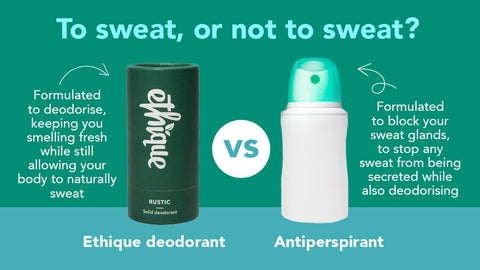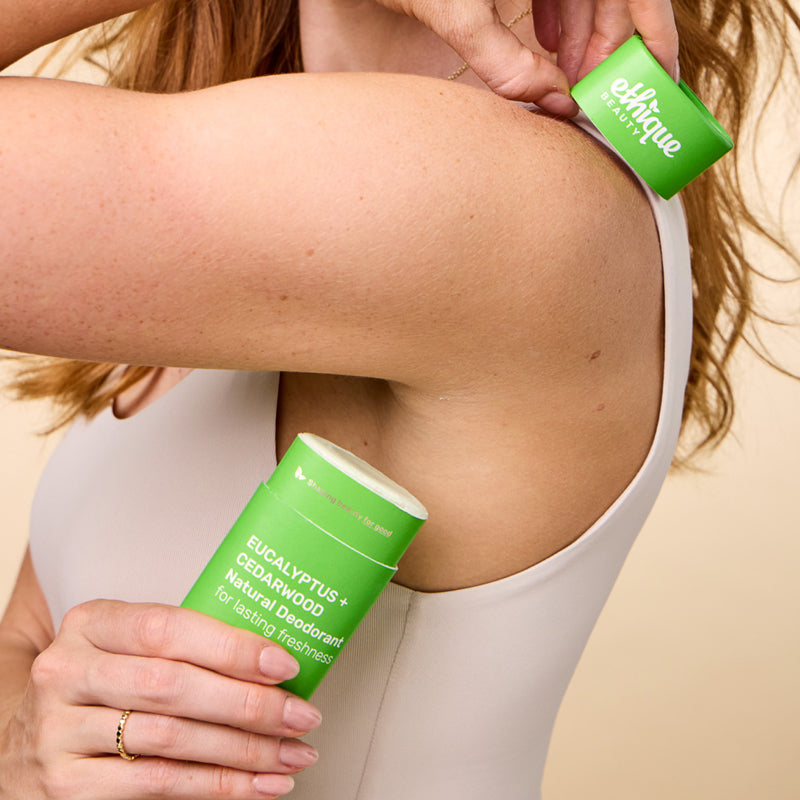Fact or myth? Busting common deodorant and antiperspirant questions!
Why did the armpits lose the war against the elbows? They were under-armed 🙋♀️
We love a good pun more than anyone else but we're even bigger fans of facts and debunking myths! And when it comes to your armpits, there are a lot of them, from transition periods (spoiler, they exist... for your underarms), to smells and pit paste.
So, we’re here to give you the low down on deodorants so you're in the know when it comes to what you're putting on your pits 💚
First things first, do you know the difference between a deodorant and an antiperspirant?
To start with, they are two very different products and you may find one suits you and your needs better than the other. To help, we’ve popped together a handy blog to easily explain the difference between the two as well as to explain how our plastic-free Ethique deodorants work. You can read that here.
Now, let’s get into some myth busting 👩🔬

Do you sweat out toxins?
Nope! Sweat is primarily salt and water. There may be tiny trace amounts of some environmental toxins present, but they are in such low quantities that they are essentially negligible.
The vast majority of what people refer to as toxins is filtered out of the bloodstream by your liver and subsequently excreted from your body via their best friends – your kidneys!
So, stopping yourself sweating under your arms will not cause an overload of toxins trapped with nowhere to go.
Does using antiperspirants containing aluminium cause or contribute to breast cancer?
There is a lot of fear around this topic however it has not been proven at all. There have been a multitude of studies and reviews of those studies in order to find out if this concern holds water. If you want to read them, you can find them here:
- The use of deodorants/antiperspirants does not constitute a risk factor for breast cancer
- Review of potential health risks posed by exposures to metallic and aluminum.
- The Health Effects of Aluminum Exposure
Don't trust them?
Internationally plenty of cancer societies have strong positions:
- National Cancer Institute: Antiperspirant Fact Sheet
- Cancer Research UK: Causes of cancer, cosmetics & toiletries
- Journal of the National Cancer Institute, Antiperspirant Use and the Risk of Breast Cancer
- Studies linking breast cancer to deodorants smell rotten, experts say
So, please don’t be concerned if you do use a conventional antiperspirant.
Do you absorb the aluminum in antiperspirants?
If you are worried about absorbing aluminium through your skin, the reality is... that you absorb very little through your skin. Your skin is incredibly good at keeping things out. You do not absorb everything you put on there.
There have been studies that show that whilst it is possible to absorb a tiny amount of aluminum from topical applications, about four micrograms, typically you ingest much more than that every day from what you eat. Aluminum is readily excreted by the body and it does not tend to bioaccumulate like some other heavy metals. There is a note here – those with kidney issues may need to avoid antiperspirants as their kidneys may not be as efficient at removing it.
However, it is important to note that aluminium has been linked to some health problems, when there is a heavy load of aluminium dust in the air and people breathe it in.
So where does the aluminum go?
The aluminum in the antiperspirant mixes with your sweat and forms a gel-like plug, which blocks the sweat gland. This is easily shed as your skin goes through its natural shedding process.

Is there a detox phase when switching from an antiperspirant to a deodorant?
There is a theory out there that for natural deodorants to work, you must first detox the synthetic ingredients from years of antiperspirant use from your system.
If it was true that you needed to detox your armpits from antiperspirant ingredients, wouldn't it also follow that you only need to apply your antiperspirant occasionally? If you need a paste or something to suck out all the old antiperspirants so you can enable yourself to sweat again, why do we need to apply it daily? The answer of course is that this is a myth, and your body doesn't hold onto the aluminium salts for very long at all. They are used up and flushed back out of your armpits. Those compounds aren't there forever, and they don't need removing. They are excreted naturally by your skin.
Now, do be careful, as a lot of people have reactions to baking soda based deodorants, as baking soda is very alkaline and readily soluble so it is tough on the skin. Some people are fine, and that's great. But if you are using a deodorant with baking soda and you keep getting sore and red underarms, it's not detoxing. That is a reaction. So please stop using that product.
Is there a transition period when switching from an antiperspirant to a deodorant?
Yes, there is! When switching between these two products, you will sometimes smell more. When you stop using antiperspirant, naturally you sweat more and while sweat itself doesn't smell, the bacterial excretions on your skin from bacteria munching on the chemical components in your sweat do. So more sweat = more bacteria AND more bacterial excretions. Delightful!
Interestingly, studies have shown that those who use an antiperspirant for years, and then stop, have much higher populations of stink-causing bacteria like staphylococcus hominis. There is some evidence that the aluminium salts affect different populations of bacteria on your skin differently, and that some species of bacteria that create smelly compounds actually thrive. So over time, as you continue to use a deodorant, the population of bacteria on your skin may start to change. So, you may have fewer of the type of bacteria that causes smell. There are many species that live on your skin, and all of those compete for resources. Further studies have shown that those who use a deodorant (not an antiperspirant), or nothing at all have fewer of those smell- causing species. It can take time for these population changes to occur. For some people that may not occur at all, because there are so many different factors making up your skin's microbial makeup. That is why deodorants are notoriously difficult to formulate and very rarely work for everyone.
To help with this transition period, it is a good idea to use a scrub on your armpits once or twice a week to give them a really good clean, as this can potentially speed up the change in your body's flora and fauna - a face cloth or an ordinary body scrub will work just fine.
What deodorant does Harry Potter wear? Ex-smelly-arMpits
All jokes aside, we hope you’ve learnt a thing or two from us! And if you’re looking for the TLDR version, here it is: if you want to make the transition from an antiperspirant to a deodorant, you may go through a period of time where you smell more (but also, you may not). The key to handle it is just to have a really good level of hygiene, apply your new deodorant a few times a day, if you need to, and scrub under your arms. You don't need to do a detox. The other thing to bear in mind, of course, is that some deodorants just won't work for you. It is not possible to make a product that suits everyone, particularly deodorant, as everybody has a different microbial makeup. So if you've tried one for several weeks and it's not working, just try another one. 
Phew, another myth busting session done. Are you loving reading these as much as we are writing them?! If you have any questions or other myths you’d like busted, send our team of Miracle Workers an email at hello@ethique.com or get in touch with us via social.

 Impact
Impact Blog
Blog Store Locator
Store Locator


